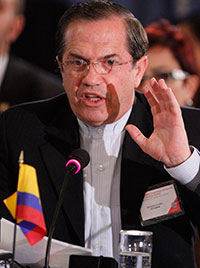By reaffirming the autonomy and independence of the regional human rights system and rejecting attempts to neutralize the work of the Inter-American Commission on Human Rights (IACHR) and its special rapporteur for freedom of expression, the Organization of American States (OAS) chose last week to discard proposals that would have made citizens throughout the hemisphere more vulnerable to abuses.
The OAS extraordinary assembly, held at the organization’s headquarters in Washington, D.C. on Friday, adopted a resolution by which the 35 member states ratified the ability of the commission to continue receiving voluntary contributions. Analysts and human rights advocates say the decision was a blow to countries of the Bolivarian Alliance for the Americas, known as ALBA, which have been pushing to preclude outside funding for the IACHR.
While a last-minute change to the resolution ensures that the war to preserve the work of the IACHR is not over, free expression advocates have won an important battle.
“[The ALBA bloc] was left totally isolated at the end of a 12-hour session of OAS foreign ministers that ended at midnight Friday,” wrote Andrés Oppenheimer, foreign affairs columnist for The Miami Herald and a CPJ board member. José Miguel Vivanco, director of Human Rights Watch’s Americas division, said the resolution was a “resounding victory” for the commission.
Countries including Costa Rica, Colombia, Panama, Chile, Uruguay, Mexico, Jamaica, Canada, and the United States played an important role in preventing efforts led by Ecuador to weaken the regional human rights watchdog. With the stated goal of strengthening the system, Ecuador had introduced a series of recommendations to bar the rapporteur’s office from seeking independent funding, reduce its autonomy by allowing member states to assert greater control, and prevent it from publishing reports on freedom of expression. None of these proposals found consensus at the assembly, and they were left out of the OAS resolution.
Late on Friday, after finding no assent for their proposals, Ecuador and Bolivia threatened to withdraw from the commission. It was then that Argentina introduced a paragraph in the resolution instructing the OAS permanent council “to continue the dialogue on the core aspects for strengthening” the system. Argentina’s proposal was a face-saving measure for the ALBA bloc, according to analysts and press reports.
While the OAS assembly represented a defeat for Ecuador and its allies, the decision to continue the debate will allow Quito to keep pushing the most restrictive proposals in the near future. This process started in mid-2011 when the OAS permanent council set up a working group to study ways to strengthen the commission. During the 2012 OAS general assembly in Cochabamba, Bolivia, Ecuadoran President Rafael Correa won initial approval for more drastic changes.
ALBA’s efforts were countered by sustained efforts by international and regional human rights and press freedom groups, including CPJ, which campaigned to preserve the independence and autonomy of the IACHR and its special rapporteur for freedom of expression. On March 18, CPJ sent a letter to all OAS foreign ministers urging them to oppose any attempts to debilitate the regional human rights system.
Dozens of opinion columns and articles were also written in media outlets throughout the Americas. Former Colombian President César Gaviria Trujillo, a past OAS secretary-general, urged “governments that are truly committed to human rights and democracy” to “stand up for the commission and put an end to this ill-conceived campaign” in a strong op-ed in The Washington Post on March 19.
